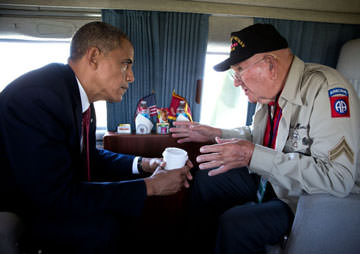Seeking Sanity on Sgt. Bergdahl
It's hard not to be cynical after the display of rancid partisanship that greeted the release of Sgt. Bowe Bergdahl after five years as a Taliban-held prisoner of war. The Greatest Generation would not have acted this way. President Barack Obama and WWII veteran Kenneth (Rock) Merritt talk onboard Marine One after departing the 70th French-American Commemoration D-Day Ceremony at the Normandy American Cemetery and Memorial in Colleville-sur-Mer, France, on Friday. White House/Pete Souza
President Barack Obama and WWII veteran Kenneth (Rock) Merritt talk onboard Marine One after departing the 70th French-American Commemoration D-Day Ceremony at the Normandy American Cemetery and Memorial in Colleville-sur-Mer, France, on Friday. White House/Pete Souza
GETTYSBURG, Pa. — There were many poignant moments in President Obama’s speech in Normandy commemorating the 70th anniversary of D-Day. But two sentences he spoke at what he called “democracy’s beachhead” seemed especially resonant back home.
“Whenever the world makes you cynical, stop and think of these men,” Obama said. “Whenever you lose hope, stop and think of these men.”
It’s hard not to be cynical after the display of rancid partisanship that greeted the release of Sgt. Bowe Bergdahl after five years as a Taliban-held prisoner of war. The Greatest Generation would not have acted this way.
Yes, Obama could certainly have handled the situation better. It’s fair to question the optics of the Rose Garden ceremony announcing Bergdahl’s freedom, to wonder why the administration did not acknowledge upfront the ambiguities surrounding his tour of duty, and to ask why Congress wasn’t alerted to the deal the administration was negotiating.
But what’s truly astounding is how many Republicans raced to turn Obama’s commitment to bringing home a POW into an outrage. It tells us something that so many GOP politicians first tweeted warmly about the good news only to take their tweets down and replace them with the party line that we never negotiate with terrorists, that Obama had endangered the nation, etc.
Four months ago, Sen. John McCain said he could support the kind of trade Obama made to get Bergdahl back. When it happened, McCain declared, “I would have not made this deal.” McCain is a national hero who spent over five years in captivity during the Vietnam War. He may have let his unhappiness with Obama’s overall Afghanistan policy get the best of him.
And there is no defense for the rush to judgment on Bergdahl’s own behavior. Those who served with him and are angry that he walked away from his base have every right to challenge what Bergdahl did and insist upon accountability. But why can’t commentators safe in their studios and offices have the decency to withhold their verdicts until all the facts are in? Bergdahl volunteered to fight for his country. This should at least earn him the chance to explain himself before the pundit mob descends.
As the charges were flying, I found myself at the scene of one of our Civil War’s bloodiest and most consequential battles for a meeting of the Aspen Institute’s Franklin Project, dedicated to making a year of national service a widely accepted norm. Leading the effort is retired Gen. Stanley McChrystal, the former commander of our forces in Afghanistan. In an interview, he offered the sanest and most balanced take on this controversy I have heard.
“I think the key thing in a case like Sgt. Bergdahl’s is you first understand there’s a responsibility to our service members and that’s very clear-cut and nobody should argue about that,” McChrystal said. “We know we have a responsibility to get them or their remains, and we go to great efforts to do that.
“And then, there’s a responsibility on individuals, service members, back toward their nation and their comrades and we should demand that and we should check into that. But we as a nation, instead of politicizing something like this, we as a nation, should look at it and say: OK, [it’s a] complex problem, how do we handle this in a way that brings us together? Because it actually makes us look weaker to our allies, it makes us look confused to our foes, and if we were very united on something like this and we just said: ‘America doesn’t leave its people but we do have a high standard,’ then I think we’d come out better.”
Precisely right, and conservatives such as my colleagues Kathleen Parker, Charles Krauthammer and David Brooks should be saluted for breaking with the party line and defending the idea that we get our POWs back.
For there is an additional cost to the dumb and destructive partisanship we’ve seen over the last week: It discredits constructive partisanship.
As the political philosopher Nancy Rosenblum noted in “On the Side of the Angels: An Appreciation of Parties and Partisanship,” we’re too quick to condemn all forms of party loyalty. Parties, she writes, are “a principal source of political creativity” and “crucial for politics in pluralist societies,” challenging each other’s “principles and policies.”
But parties, she adds, are also supposed to impose “political self-restraint,” along with “mental and emotional discipline.”
In the Bergdahl episode, self-restraint and discipline disappeared.
E.J. Dionne’s e-mail address is ejdionne(at)washpost.com.
© 2014, Washington Post Writers Group
Your support matters…Independent journalism is under threat and overshadowed by heavily funded mainstream media.
You can help level the playing field. Become a member.
Your tax-deductible contribution keeps us digging beneath the headlines to give you thought-provoking, investigative reporting and analysis that unearths what's really happening- without compromise.
Give today to support our courageous, independent journalists.








You need to be a supporter to comment.
There are currently no responses to this article.
Be the first to respond.